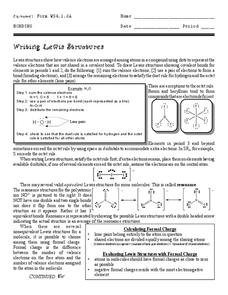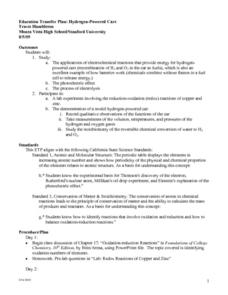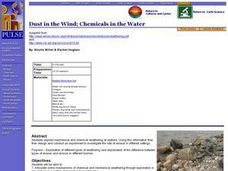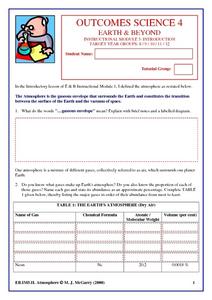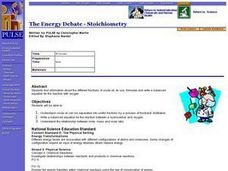Curated OER
Balancing Act
In this balancing chemical equations worksheet, students learn how to use coefficients to balance chemical equations. They practice balancing 7 equations and are given one challenge equation to balance.
Curated OER
Discovery 4-1 Atomic Emission Spectra
In this emission spectra worksheet, students use a spectroscope to observe three types of spectra. These include continuous spectrum, emission spectrum and absorption spectrum.
Curated OER
The Air Up There!
Learners create a model of a column of air and discover one of the reasons why low and high pressure systems exist and why low pressure is often associated with bad weather.
Curated OER
Ionic Chemical Formulas Days 1 & 2
Students study polyatomic ions and write binary and ternary ionic chemical formulas. They explore putting together different monatomic ions and coming up with as many chemical formulas as possible. They play a game similar to memory...
Curated OER
Oxidation and Salt
Students study the reaction on iron in water, air, and sodium chloride. They create a situation that shows this process and gives them the opportunity to hypothesize what, why, and how. They keep records and do an oral and written ...
Curated OER
Writing Lewis Structures
In this Lewis structures worksheet, high schoolers read about drawing Lewis structures and how to identify valence electrons. They draw Lewis structures for eight given compounds.
Curated OER
Resources - A Reading Guide
In this resources worksheet, students compare and contrast physical and chemical properties and changes. Students review the periodic table, pattern of atomic numbers and chemical reactivity. This worksheet has 56 short answer questions.
Curated OER
Creating Bonds
In this creating bonds instructional activity, students create 2-D and 3-D models of the molecular formula provided. Students complete a chart of information about the molecular formula given.
Curated OER
Chemical Bonding and Shapes of Molecules
In this chemical bonds worksheet, students review the different types of bonds, Lewis dot structures, ions, and molecule shapes. This worksheet has 10 matching, 17 multiple choice, and 3 drawing questions.
Curated OER
Hydrogen Powered Cars
Students apply the principles of chemistry to investigate the concept of how a hydrogen powered car works. They study the electrochemical reactions that provide the energy source. Students also record observations in the functioning of a...
Curated OER
Hazardous Waste
Students define technology and relate the definition to the production of electricity using nuclear energy. They also list the technologies involved and relate the use of these technologies to their effect on society in general, and...
Curated OER
What is a Chemical Reaction?-Evidence of Change
In this chemical reactions learning exercise, students experiment with hydrochloric acid and copper (I) chloride to identify the types of reactions they undergo with various other substances. They also observe the law of conservation of...
Curated OER
Empirical Formulas
In this empirical formulas worksheet, students read about determining empirical formulas from chemical formulas. They determine the empirical formula given ten molecular formulas. They also find the molecular formulas given the mass and...
Curated OER
Organic Chemistry Reactions
In this organic chemistry reactions worksheet, learners are given a table with 8 different types of reactions that occur with organic molecules. Students answer 3 questions about the reactions given in the table and indicate which...
Curated OER
GCSE Module 6 Revision Guide-Chemistry-Oil, Fossil Fuels and Earth's Atmosphere
For this oil, fossil fuels and Earth's atmosphere worksheet, students answer 3 questions about the origin of oil and its uses, the effects of burning oil and fossil fuels on the Earth's atmosphere and the origin and maintenance of the...
Curated OER
Dust in the Wind; Chemicals in the Water
Students explore mechanical and chemical weathering at stations. They articulate some mechanisms of chemical and mechanical weathering through exploration in a lab. Students stations describe how chemical weathering differs from...
Curated OER
Earth and Beyond
In this earth and beyond worksheet, students answer short answer questions about the atmosphere, the chemical compounds in Earth's atmosphere. Students visit different websites to conduct research of the discoveries of the scientist who...
Curated OER
Water Cycle
Ninth graders explore ways water moves through various reservoirs on Earth, examine how human activities change water cycle, investigate substances present in water that indicate human activity, and discuss how understanding water cycle...
Curated OER
Radioactive Decay and Half-Life
Students describe how the mass of a radioactive isotope changes with time and the factors that affect the rate of radioactive decay. They write nuclear decay equations to represent natural transmutation. This activity is accomplished...
Curated OER
The Energy Debate - Stoichiometry
Learners determine crude oil can be separated into useful fractions by a process of fractional distillation. They write a balanced equation for the reaction between a hydrocarbon and oxygen.
Curated OER
More Chemical Bonding
In this chemical bonding worksheet, students review the three types of compounds: ionic, covalent, and polyatomic. Students practice drawing the covalent bonds of given compounds. This worksheet has 5 drawings and 13 fill in the blank...
Curated OER
Types of Chemical Reactions
In this chemical reactions learning exercise, students are given directions about three types of reactions and how to write balanced equations for each. They then are given ten practice problems to complete using the information given.
Curated OER
Balancing Equations Online 2
In this balancing equations worksheet, high schoolers use an on line site to practice balancing equations at the beginner level, the intermediate level and the advanced level. They balance four equations for the combustion of different...
Curated OER
More Chemical Bonding
In this chemical bonding worksheet, high schoolers review the three types of bonds including ionic, covalent and polyatomic compounds. They identify 8 compounds as ionic, covalent or polyatomic and they make 4 ionic compounds and they...







